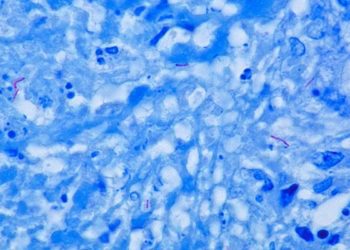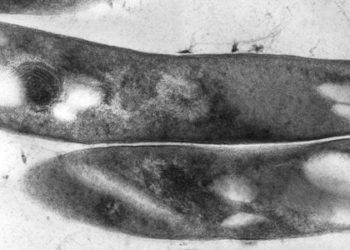Bedaquiline efficacious in treating multidrug resistant tuberculosis: phase 2 trial
1. After 24 weeks, patients who were given bedaquiline yielded a faster sputum culture conversion rate when compared to placebo. Both groups were given a five-drug, second-line antituberculosis background regimen.
2. More deaths occurred in patients treated with bedaquiline compared to treatment with placebo.
Evidence Rating Level: 1 (Excellent)
Study Rundown: Although current antibiotic treatments have been successful in treating tuberculosis, the recent rise in multidrug resistant strains has proven to be a major challenge. Of the 8.6 million cases of tuberculosis in 2012, 450,000 were due to multidrug-resistant strains. In late 2012, for the first time in decades, a novel tuberculosis drug was approved by the FDA. This drug, called bedaquiline, works by inhibiting mycobacterial ATP synthase. Stage 1 of the TMC207-C208 phase 2b study found that the addition of bedaquiline to the preferred therapy for 8 weeks resulted in increased antibacterial activity.
In this stage 2 of the phase 2b trial, the authors further evaluated the efficacy and safety of bedaquiline with a longer treatment duration of 24 weeks. Results were consistent with that of the previous trial: the addition of bedaquiline to a conventional five-drug background regimen led to faster and more culture conversions at 120 weeks when compared to placebo plus the same background regimen. Notably, more deaths occurred in the group treated with bedaquiline as compared to placebo, although data was statistically insignificant.
While the results are promising, the study was limited by the small sample size, only 79 patients received bendaquiline. In addition, the study also excluded patient receiving antiretroviral therapy for HIV infection. The increased mortality rate with bendaquiline is also concerning.
Click to read the study, published today in NEJM
Click to read the accompanying editorial in NEJM
Relevant Reading: Drug -resistant tuberculosis
In-Depth [randomized controlled trial]: This study recruited patients 18-65 years old who were recently diagnosed with pulmonary multidrug resistant tuberculosis. Trial sites were set up across 8 countries around the world. The patients were randomized to receive either bedaquiline or a placebo in addition to a five-drug, second-line anti-tuberculosis background regimen.
60 patients discontinued prematurely as a result of adverse events encountered or withdrawal of consent. The median time to sputum-culture conversion was faster in the bedaquiline compared to the placebo group of 2.44 (95% confidence interval [CI], 1.57 to 3.80, P< 0.0001). Additionally, it was supported that more patients in the bedaquiline group rather than the placebo group had confirmed culture conversion at both 24 and 120 weeks: 52 of 66 patients (79%) and 38 of 66 (58%) in the two groups, respectively, at 24 weeks (P= 0.008). In the bedaquiline group, 10 of 79 (13%) patients died as compared to 2 of 81 (2%) in the placebo group (P=0.02).
Image: PD
©2012-2014 2minutemedicine.com. All rights reserved. No works may be reproduced without expressed written consent from 2minutemedicine.com. Disclaimer: We present factual information directly from peer reviewed medical journals. No post should be construed as medical advice and is not intended as such by the authors, editors, staff or by 2minutemedicine.com. PLEASE SEE A HEALTHCARE PROVIDER IN YOUR AREA IF YOU SEEK MEDICAL ADVICE OF ANY SORT.







